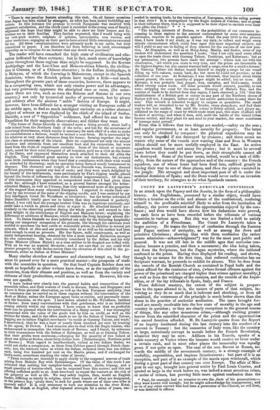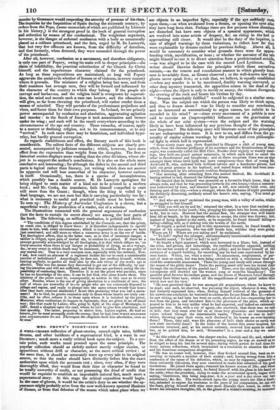COUNT DE LASTETRIE'S AURICULAR CONFESSION
Is an attack upon the Papacy and the Jesuits, in the form of a philosophic. history. An Englishman, possessed by a similar object, would have. Written a treatise on the evils and abuses of the confessional, confining
himself to the predicable likely to arise from the institution of celibacy, the power exercised and he opportunities enjoyed by the con- fessor ; and then would have shown how his deductions were proved, by such facts as have been recorded before the tribunals of various, countries in various ages. But this was too limited a field to satisfy the ambition of a Fienchman. The Count De Lasteyrie takes a larger survey. He traces the history of confession through the Eastern and Pagan nations of antiquity, as well as among the Jews and primitive Christians ; showing that with them confession (he rather means admission—acknowledgment*) was for the most part public and general. It was not till late in the middle ages that auricular con- fession became a practice, and then a sacrament; the idea being taken, not from the Scriptures, but the Pagan mysteries, where the initiated confessed to the priest. Having thus displayed his reading, and shown, though by no means for the first time, that enforced confession has no Scripture warrant, he proceeds to exhibit its abuses. This he does from the records of the Romish Church as contained in Papal bulls and the prices affixed for the remission of sins, (where formal offences against the power of the priesthood are charged higher than crimes against morality,)' as well as from the writings of the casuists, and the records of the Inqui- sition, or of the lay tribunals in Spain, Italy, and France.
From deficient mastery, the extent of the subject in propor- tion to the space allotted to it, the nature of parts of that subject, in- volving as they do so much that is indecent and shocking, or from all combined, the rottenness of the principle is much better shown than the abuse in the practice of auricular eonfesaion. The cases brought for- ward are mostly resolvable into the low state of morality in the age and. country in question ; or they are clearly exceptions to the general course of things, like any other monstrous crime,—although exciting greater horror from the sanctified character of the priest and the opportunities his sacred function afforded. M. De Lasteyrie quotes from the Report of an inquiry instituted during the last century into the conduct of a convent in Tuscany : but the nunneries of Italy were, like the country at large, notoriously corrupt in morals before the French Revolution, whatever they may be now. Addison in his Travels, speaks of noble nunnery at Venice where the inmates would receive no lover under a certain rank, and in most other places the immorality was equally gross if not quite ao open. The case of the nun Bavent at Rouen, to- wards the middle 'of the seventeenth century, is a strange example of credulity, superstition, and impious licentiousness; but part of it is an exception, and part of it an example of the mania upon witchcraft, which during a great part of that century ran over Europe. The affair of Min- grat in our age, brought into general notice by Paul Louis Courier, and quoted at large in the work before us, was indeed a most atrocious crime, or series of crimes, but proving little more against confession than the
* Paul, for example, had no occasion to own the facts of his persecutions — they were known well enough; but he might acknowledge his transgression • rind so on of any other convert who had been a persecutor of the Church, an evil livers or was detected in offence.
murder by Greenacre would respecting the atrocity of persons of his class. The inquiries by the Inquisition of Spain during the sixteenth century, by orders from the Pope, (some memorials of which are published by Llorente in his history,) is the strongest proof in the book of general corruption and seduction by means of the confessional. The weightiest argument, however, is the danger of enforced confession with a body so unnaturally placed as a celibate priesthood, and the fact, urged by M. De Lasteyrie, that but very few offences are known, from the difficulty of detection, and that formerly, when detected, they were concealed through the power of the priesthood.
After all, however, confession as a sacrament, and therefore obligatory, is only one part of Popery, owing its main evil to deeper principles—the claim of infallibility, the practical substitution of the Church for Christ himself, and the superhuman character claimed for the priesthood. As long as these superstitions are maintained, so long will Popery aggravate the social evils whether of licence or of violence, in every country where it prevails. The ministers of a religion being but men, and from their numbers but average men, they will be formed and influenced by the character of the country to which they belong. If the people are corrupt and barbarous, and the religion itself is overgrown by supersti- tion, the mind and morals such a race can bestow, and the education it will give, so far from elevating the priesthood, will rather render them a means of mischief. They will partake of the predominant prejudices and vices, and foster them for their own purposes. In Ireland, we see priestly power accompanied by confession and absolution, aggravating agitation and murder : in the South of Europe it took assassination and licence under its wing ; and such will be the result everywhere according to the circumstances of the age and country. These remarks, of course, apply to a mature or declining religion, not to its commencement, or to any "revival." In such cases there may be fanaticism, and individual hypo- crisy, but hardly general corruption.
As regards readableness and effect, the literary merit of this book is considerable. The salient facts of the different subjects are clearly pre- sented, accompanied by judicious remarks ; which, however, have more effect from the expression than weight from the . thoughts. The first or historical section displays more reading than the other divisions, whose ob- ject is to support the author's conclusions. It is also on the whole more conclusive and interesting; for although the defect in the second and third parts is logical rather than literary, yet writing which does not answer its apparent end will lose somewhat of its character, however curious in itself. Occasionally, too, there is a species of incompleteness, which possibly has a double source. M. De Lasteyrie apologizes for being obliged to omit matter of a kiud not to be printed in a modern book ; and Mr. Cocks, the translator, feels himself compelled to omit still more than the Count ; though, when the thing is veiled by a dead language, we are not sure but this is carrying particularity too far : what is necessary to useful and practical truth must be borne with. To sum up : The History of Auricular Confession is a clever, but a superficial work ; the production of a reader, not of a scholar.
The illustrations connected with the general arguments of confession (not the facts to sustain its secret abuse) are amongpthe best parts of the book. The following, on military confession, is pointed and Clever.
" The conditions of this dogma established by the Councils are, that the priest, to remit sins, is obliged to know them: it is therefore indispensable to specify them to him, with every circumstance; which is impossible in the cases we have just mentioned, and still more so when a numerous army is on the eve of battle. Yet theologians affirm, that in the latter case, as in that of imminent danger, a soldier is obliged, upon pain of mortal sin, to confess to a priest. If there be a precept generally acknowledged by all theologians, it is that which obliges us, on every occasion when there is any danger or probability of dying, as on a voyage, &c., or any event in which death may be imminent, to confess, if we are guilty of any mortal sin.' That is a very common case, especially with the military. Now, 1 ask, how could an almoner of a regiment incline his ear to such a considerable number of individuals? Accordingly, he does not, but confines himself, without hearing anybody, to pardon all their sins by the sole virtue of the words ego to absolvo. This was the means they discovered to get out of the difficulty, by say- ing the intention and will are sufficient and that sins are pardoned, seeing the im- possibility of confessing them. Therefore it is not the priest who pardons, since he has no knowledge of the sins; it can be but God, who alone knows them. The ministry of the priest must be, consequently, as useless in this case as in every other. Besides, where is the use of giving absolution to a multitude of men, the half of whom are unworthy of it—to people who are too commonly disposed to pillage and rapine, and ready to plunge into the same crimes twenty-four hours after they have received absolution? Isnot this profaning what you call a sacra- ment? As to God, he grants remission only to those whose hearts are truly con- trite, and he often refuses it to those upon whom it is lavished by the priest. Moreover, when confessions do happen in regiments, they are given in an off-band way; like that made by Lahire, who, going to fight at the siege of Montargis, in 1427, found a chaplain upon the road, whom he told to give him absolution, and that speedily. The latter, proposing to shrive him, Lahire replied, He had no leisure, for he must promptly smite the enemy; that he had done WHAT SOLDIERS ARE ACCUSTOMED TO DO. Thereupon the chaplain dealt him absolution, even as he was."























 Previous page
Previous page